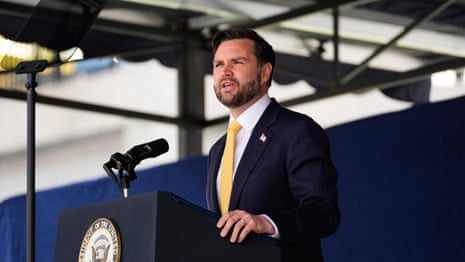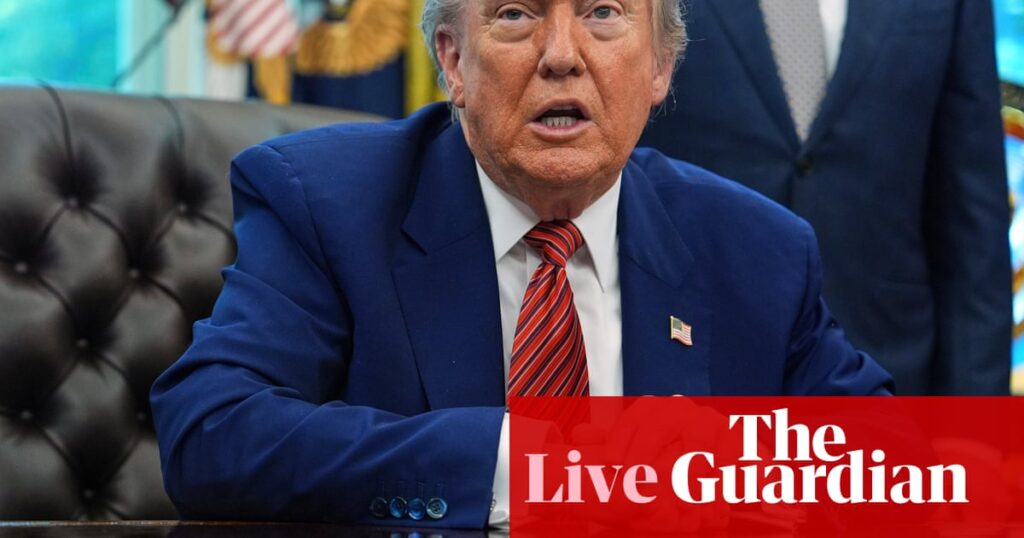Judge overturns Trump order targeting law firm Jenner & Block
A US judge on Friday overturned a Trump executive order targeting Jenner & Block, a big law firm that employed a lawyer who investigated him.
Trump’s executive order, called Addressing Risks from Jenner & Block, suspended security clearances for the firm’s lawyers and restricted their access to government buildings, officials and federal contracting work.
Trump accused the law firm of engaging in activities that “undermine justice and the interests of the United States”, claiming that it participated in politically driven legal actions. In the executive order, Trump specifically criticized the firm for hiring Andrew Weissmann, an attorney who worked on Robert Mueller’s investigation into allegations of Russian influence in Trump’s 2016 campaign.
The firm sued to block Trump’s order, arguing it violated the constitution’s first and fifth amendments.
A US district judge ruled on Friday that Trump’s directive violated core rights under the US constitution, mirroring a 2 May ruling that struck down a similar executive order against law firm Perkins Coie.
Apart from Jenner and Perkins Coie, two other firms – WilmerHale and Susman Godfrey – have sued the Trump administration to permanently block executive orders he issued against them.
Share
Updated at 16.41 EDT
Key events
Please turn on JavaScript to use this feature
A US federal judge did not mince words when calling a Trump executive order unconstitutional, which sought to target Jenner & Block, a big law firm.
According to the judge, the Trump administration went after the law firm because of the causes it champions, the clients it represents and a lawyer the firm once employed.
“Going after law firms in this way is doubly violative of the Constitution,” US District Judge John D Bates said in a ruling on Friday.
Trump signed an executive order in March, targeting Jenner & Block by suspending security clearances and restricting their access to government buildings, officials and federal contracting work. This was, Trump claimed, because of politically motivated “lawfare” the firm engaged in.
By attempting to push forward this executive order, Trump attempted to “chill legal representation the administration doesn’t like, thereby insulating the Executive Branch from the judicial check fundamental to the separation of powers”.
Bates added that the Trump executive orders against law firms “follow the same recipe: other than personalized touches in their first sections, they generally direct the same adverse actions towards each firm and decry the threat each firm poses to national security and the national interest.”
Bates was appointed to the District of Columbia in 2001 by President George W Bush. He blocked Trump’s executive order completely.
Share
Updated at 17.07 EDT
Judge overturns Trump order targeting law firm Jenner & Block
A US judge on Friday overturned a Trump executive order targeting Jenner & Block, a big law firm that employed a lawyer who investigated him.
Trump’s executive order, called Addressing Risks from Jenner & Block, suspended security clearances for the firm’s lawyers and restricted their access to government buildings, officials and federal contracting work.
Trump accused the law firm of engaging in activities that “undermine justice and the interests of the United States”, claiming that it participated in politically driven legal actions. In the executive order, Trump specifically criticized the firm for hiring Andrew Weissmann, an attorney who worked on Robert Mueller’s investigation into allegations of Russian influence in Trump’s 2016 campaign.
The firm sued to block Trump’s order, arguing it violated the constitution’s first and fifth amendments.
A US district judge ruled on Friday that Trump’s directive violated core rights under the US constitution, mirroring a 2 May ruling that struck down a similar executive order against law firm Perkins Coie.
Apart from Jenner and Perkins Coie, two other firms – WilmerHale and Susman Godfrey – have sued the Trump administration to permanently block executive orders he issued against them.
Share
Updated at 16.41 EDT
Cases of measles, a viral infection that was considered eliminated from the US since 2000, have climbed slightly to 1,046.
There have been 22 new cases in the past week, the Centers for Disease Control and Prevention said, a small increase that signals outbreaks are slowing down.
Ten of those cases came from Texas. Other states with active measles outbreaks include Michigan, Montana, North Dakota, Ohio, Pennsylvania and Tennessee. Indiana said its state’s outbreak was over.
Two young children and an adult have died from measles-related illnesses this year, the AP reports. The virus that causes measles is airborne and highly contagious, although preventable through vaccines.
Share
Updated at 16.24 EDT
Here are the key takeaways from Harvard’s legal battle over the Trump administration’s international student ban, from my colleague Anna Betts.
Share
Trump’s Harvard visa threat could wipe out several of school’s sports teams
Some of Harvard’s sports teams would be virtually wiped out by the Trump administration’s move to make the Ivy League school with the nation’s largest athletic program ineligible for international student visas.
Harvard’s 42 varsity sports teams are the most in the nation, and Sportico reported last month that 21% of the players on the school’s rosters for the 2024-25 seasons – or 196 out of 919 athletes – had international home towns. The site noted that some could be US citizens or green card holders who wouldn’t need one of the international visas at issue in the Trump administration’s escalating fight with the university.
Seven of the eight rowers on the men’s heavyweight crew team that just won the Eastern Sprints title – and is headed to the national championships – list international home towns on the school’s website. Mick Thompson, the leading scorer last season, and Jack Bar, who was a captain, are among a handful of Canadians on the men’s hockey roster; 10 of the 13 members of the men’s squash team and more than half of the women’s soccer and golf rosters also list foreign home towns.
Share
Updated at 15.45 EDT
Supreme court temporarily halts access sought by watchdog group to Doge records
The supreme court temporarily paused judicial orders requiring the so-called “department of government efficiency”, established by Donald Trump and spearheaded by his billionaire adviser Elon Musk, to turn over records and answer questions in the coming days and weeks concerning its operations.
The court put on hold Washington-based US district judge Christopher Cooper’s orders for Doge to respond to a government watchdog group’s requests for information after finding that Doge is probably a government agency covered by the federal Freedom of Information Act.
The supreme court’s action, called an administrative stay, gives it additional time to consider the justice department’s formal request to block Cooper’s order while litigation proceeds in a lower court.
Share
Updated at 15.46 EDT
The day so far
This morning a federal judge in Boston swiftly blocked the Trump administration’s attempt to revoke Harvard’s ability to enrol international students, mere hours after the university sued the DHS. In its lawsuit Harvard condemned the administration for unconstitutional retaliation over its refusal to surrender to the White House’s political demands. It said the government’s move would “erase a quarter of Harvard’s student body”, force it to retract admissions for thousands of people, and has already thrown “countless” academic programs, clinics, courses and research laboratories into disarray. “Without its international students, Harvard is not Harvard,” the university wrote in its legal complaint.
Harvard’s president Alan Garber wrote in a letter to the university’s community:
The revocation continues a series of government actions to retaliate against Harvard for our refusal to surrender our academic independence and to submit to the federal government’s illegal assertion of control over our curriculum, our faculty, and our student body.
We condemn this unlawful and unwarranted action. It imperils the futures of thousands of students and scholars across Harvard and serves as a warning to countless others at colleges and universities across the country who have come to America to pursue their education and fulfill their dreams.
US district judge Allison Burroughs granted the university’s request for an immediate temporary restraining order, which she said was necessary because Harvard had “made a sufficient showing … that, unless its motion for a temporary restraining order … is granted, it will sustain immediate and irreparable injury before there is an opportunity to hear from all parties”. She has set a hearing for 29 May to consider the administration’s actions.
Trump doubled down earlier, telling reporters that “Harvard’s going to have to change its ways” and said he was also “looking at a lot of things” when asked if his administration was looking at stopping other universities besides from taking in foreign students. Before Burroughs’s ruling, a White House spokesperson had also earlier dismissed Harvard’s lawsuit as “frivolous”.
While there are now two weeks of reprieve, there were reports of Chinese students at Harvard cancelling flights home today and seeking legal advice on staying in the United States as the Trump administration continues to wage war on the Ivy League university – and others – and amid years of tensions between the two countries. Per the New York Times (paywall), Trump’s attacks on elite institutions like Harvard have the potential to “reshape the broader relationship between (the US and China) by cutting off one of the few remaining reasons that people in China still admire the United States”.
The Trump administration accused Columbia University of violating the civil rights of Jewish students by “acting with deliberate indifference” toward what it described as a “hostile environment” for Jewish students on campus.
Trump ordered the nation’s independent nuclear regulatory commission to narrow regulations and expedite new licenses for reactors and power plants, seeking to shrink a multi-year process down to 18 months. The requirement was part of a batch of executive orders signed by Trump earlier today aiming to boost US nuclear energy production amid a boom in demand from data centers and AI.
Vice-president JD Vance said that the US under Trump will choose carefully when to use military force and will avoid involvement in open-ended conflicts in a speech that signalled a huge shift in 21st-century US foreign policy.
Trump said that a 25% tariff he said he will impose on Apple will also apply to Samsung and other smartphone makers who don’t make their products in the United States. “When they build their plant here, there’s no tariffs,” he said.
Trump said he’s not looking for a trade deal with the EU – which he announced earlier today will be slapped with 50% tariffs from 1 June – but said he’d be open to talking about a delay if companies were willing to build their plants in the US.
US special envoy Steve Witkoff held more than two hours of talks with an Iranian delegation in Rome today about Tehran’s nuclear program and agreed to meet again in the near future, a senior US official said.
Share
Updated at 15.47 EDT
US-Iran talks ‘continue to be constructive’, says US official after two-hour meeting in Rome
US special envoy Steve Witkoff held more than two hours of talks with an Iranian delegation in Rome today about Tehran’s nuclear program and agreed to meet again in the near future, a senior US official said.
“The talks continue to be constructive – we made further progress, but there is still work to be done. Both sides agreed to meet again in the near future. We are grateful to our Omani partners for their continued facilitation,” the official said.
Share
Updated at 15.03 EDT
Trump says he’s not looking for a deal with the EU
Trump says he’s not looking for a trade deal with the EU – who he announced earlier today will be slapped with 50% tariffs from 1 June.
He says the EU is “too slow-moving” and “if they build their plants (in the US) then they have no tariff at all”.
I’m not looking for a deal. We’ve set the deal, it’s at 50%. But there’s no tariff if they build their plant here … If somebody wants to build a plant here I can talk to them about a little bit of a delay, while they’re building their plant, which is something that might be appropriate, maybe.
Share
Updated at 14.38 EDT
Trump says his tariffs on Apple will also apply to Samsung

Lauren Aratani
Trump says that a 25% tariff he said he will impose on Apple will also apply to Samsung and other smartphone makers.
“Or it would not be fair,” he says, adding that the White House will “appropriately have that done by the end of June”.
“When they build their plant here, there’s no tariffs. So they’re going to be building plants here,” he says.
When Trump first announced the tariff Friday morning, he targeted Apple CEO Tim Cook, who said recently that the company was shoring up manufacturing in India.
“I said that’s okay to go to India, but not going to sell into here without tariffs,” Trump says.
Share
Updated at 15.43 EDT
Trump says his administration “will do something very soon” to make it possible for people to come to the US and “have a road towards” citizenship.
Share
‘Harvard’s going to have to change its ways,’ says Trump
Following the signing of those executive orderes, Trump has been taking questions from the media.
Asked by a reporter if his administration was looking at stopping other universities besides Harvard from taking in foreign students, Trump said:
We’re taking a look at a lot of things.
Citing the “billions of dollars” Harvard receives, Trump adds:
Harvard’s going to have to change its ways.
Share
Updated at 15.03 EDT
Here’s the clip of JD Vance saying the Trump administration has “reversed course” on US foreign policy, affirming that there will be “no more undefined missions, no more open-ended conflicts”.

Share
Trump signs executive orders seeking to fast-track new nuclear licenses and overhaul regulatory agency
Donald Trump has ordered the nation’s independent nuclear regulatory commission to narrow regulations and expedite new licenses for reactors and power plants, seeking to shrink a multi-year process down to 18 months, Reuters reports.
The requirement was part of a batch of executive orders signed by Trump just now aiming to boost US nuclear energy production amid a boom in demand from data centers and AI.
Licensing for reactors in the US can take over a decade at times, a process designed to prioritize nuclear safety but which has discouraged new projects.
“With these actions, President Trump is telling the world that America will build again, and the American nuclear renaissance can begin,” said Michael Kratsios, director of the White House office of science and technology policy.
The moves include a substantial overhaul of the Nuclear Regulatory Commission that includes looking at staffing levels and directing the energy and defense departments to work together to build nuclear plants on federal lands, a senior White House official said.
The administration envisions the Department of Defense taking a prominent role in ordering reactors and installing them on military bases.
The orders also seek to reinvigorate uranium production and enrichment in the United States, the senior White House official said.
Trump declared a national energy emergency in January as one of his first acts in office, saying the US had inadequate supplies of electricity to meet the country’s growing needs, particularly for data centers that run artificial intelligence systems.
Most of Trump’s actions have focused on boosting fossil fuels like coal, oil and natural gas, but administration officials also support nuclear power, which in recent years has attracted growing bipartisan support.
Share
Updated at 14.23 EDT
I spoke too soon. Reuters is reporting that Donald Trump is making the nuclear announcement now and signing his executive orders.
His secretary of the interior, Doug Burgum, said there will be four orders signed.
Share
Updated at 14.13 EDT
Trump expected to sign executive orders to boost nuclear industry – Reuters
Executive orders were on Donald Trump’s schedule for 1pm ET today. It’s obviously now way past that time but, as you may know, Trump often runs a tad late to these things. He has also been unusually quiet on Truth Social for the past six hours … so I’ll bring you the latest on what’s happening with the orders when we know more.
Earlier, Reuters reported that as early as today Trump was due to sign executive orders meant to accelerate nuclear energy development. Trump is expected to streamline the regulatory process for new reactor approvals and enhance fuel supply chains, the news agency reported citing four sources familiar with the matter. The report saw shares of nuclear power companies surge.
Share
Updated at 14.10 EDT



